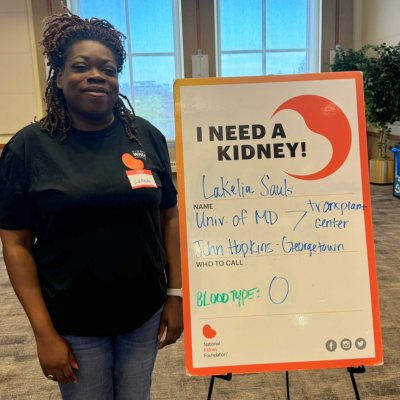May 06, 2025
Are dialysis and transplantation the only options for managing kidney failure? For some people, the answer is no. Conservative care is an option that prioritizes quality of life without these treatments.
What is Conservative Care?
According to the National Institute of Diabetes and Digestive and Kidney Diseases (NIDDK), conservative care for kidney failure focuses on managing symptoms without dialysis or a transplant.
"Conservative care is also known as supportive care or palliative care," said Nurse Practitioner Christine Corbett, leader of the Coalition for Supportive Care for Kidney Patients. "It helps people with kidney failure live as well as they can for as long as possible without dialysis or transplant."
Listen to "Conservative Care for Kidney Patients" on Spotify or Apple Podcasts.
Some people decide that dialysis or a transplant isn't the right choice for them because;
- They have other serious health problems.
- They want to focus on comfort instead of treatments that might be hard on the body.
- They don't qualify for home dialysis options and prefer not to go to a dialysis center.
Instead of replacing kidney function, conservative care professionals work to slow the progression of kidney disease and manage symptoms using diet and medications.
"The conservative care team works with patients and their healthcare team to manage pain, swelling, tiredness, and other symptoms of kidney disease," Christine said. "They also support a patient's family and loved ones."
Since not seeking dialysis or a transplant for kidney failure will result in death, healthcare practitioners also screen people for depression.
"Depression can’t be the key factor driving a patient's decision to never start or stop dialysis," Christine said. "If depression is present, we treat it before revisiting the discussion."
The goal of a conservative care doctor is to help people feel good and reduce hospital stays as they prepare for the end of life.
Is Conservative Care the Same as Hospice?
No. Conservative care is different from hospice.
Hospice is for people with a life-limiting illness who have less than six months to live.
“Many people who choose conservative care live over 14 months,” said Christine. “They may decide to transition to hospice as they get closer to the end of their life.”
A Caregiver’s Experience with Conservative Care
Accepting that a loved one with kidney failure doesn’t want to start dialysis or get a transplant can be challenging. Here is how kidney advocate Bobbie Reed navigated this tough situation.
Accepting a Painful Decision
"My mother moved closer to me when my father passed away in 2021. Since she has diabetes, I set her up with a new nephrologist (kidney doctor)," Bobbie said. "In early 2024, her kidney function dropped dramatically. Her kidneys were failing."
The only option was dialysis.
"My mother, who was 86, immediately said, 'No, I don't want to do dialysis. I want to live my life."
But Bobbie had experience with kidney disease. She'd been helping her son manage his kidney disease, including home hemodialysis, for over a decade.
"I was upset because I was willing to help her do peritoneal dialysis (PD) or home hemodialysis,” said Bobbie. “I'm a fighter. I love my mom and didn't want to lose her.”
It took some time to accept, but Bobbie knew it was her mother’s decision in the end. Speaking with a palliative care specialist further helped Bobbie come to terms with this decision.
“The doctor and her team talked with my mom and our whole family. They were so informative,” Bobbie said. “They also focused on how she felt, not just her lab numbers. It was comforting."
Bobbie's mother left the appointment happy with her decision. She passed away peacefully in late December 2024.
“I have a lot of knowledge of kidney disease and connections within the kidney community, but I still didn't know about conservative care,” said Bobbie. “I wish we had known and talked about this option earlier on in her journey. It may have been easier to accept.”
Subscribe today!
Join the NKF Blog Newsletter
Get inspirational stories and kidney disease resources delivered to your inbox every month. You'll gain practical insights and expert advice to help you better understand and manage your kidney health, no matter where you are on your kidney journey.
How to Start the Conversation About Conservative Care
Starting the conversation about conservative care can feel overwhelming. These steps will help make sure you or your loved one's wishes are respected.
- Talk to a Doctor Early: Discuss all treatment options, including conservative care, as soon as possible.
- Involve a Support System: Bring family members, close friends, or caregivers to appointments to ensure everyone understands your wishes.
- Make Wishes Official: Complete an advance directive and/or a POLST (Physician Orders for Life-Sustaining Treatment) form to document your medical preferences.
- Designate a Healthcare Power of Attorney: Choose someone who understands and will honor your choices if you cannot communicate with them.
"Conservative care helps patients live their best possible lives and do the things they love with the people they cherish,” Christine said. “I hope we can normalize having conversations about conservative care as a treatment option."



















